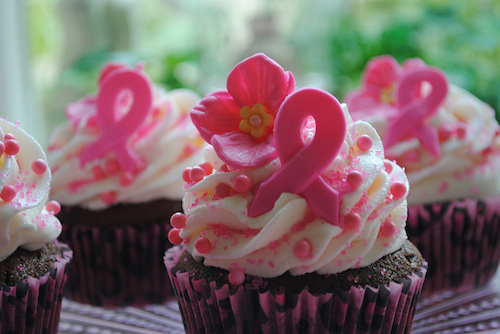October is Breast Cancer Awareness Month, the jolly time of year when pink ribbons adorn merchandise including chemical-laden cleaning products that studies have linked to cancer.
Ribbons appear on other things, too—tennis rackets, toilet paper, alcoholic beverages.
Corporations love the ribbon.
It connects their products—mostly unrelated to cancer (and sometimes a direct cause of it)—to the very center of your human heart.
If you or anyone you know has had cancer, the ribbon probably softens you up, makes you look twice. Because buying that Mike’s Hard Lemonade with the pink ribbon will save lives.
But it won’t.
The irony of the pink ribbon first struck me in October 2009 as I wandered around my local supermarket after my first chemo treatment for breast cancer. I was 27, tired and disturbed by the idea that buying toxic chemicals somehow supported the fight to save lives.
Months later, I was asked to volunteer with a local Susan G. Komen event, but couldn’t help wonder how much those top executives were making compared to the amount of money spent on research.
They’re making a lot of money.
NBC news investigated (and discovered), Komen founder Nancy Brinker landed a 64 percent raise for a total pay package of $684,000 in 2013.
American Cancer Society (ACS) executives also rake it in, ranking among the top-paid non-profit executives in the country.
So, it turns out, cancer pays well.
ACS is backed by every major pharmaceutical company, including Merck, AstraZeneca and Pfizer. That’s probably why, in 2013, ACS spent 60 percent of total research dollars on biology and cancer control issues—topics sponsors stand to profit from—compared to about 20 percent on causes of cancer and prevention.
This might not be so bad if it weren’t for ACS’s stance, (or lack thereof), on environmental carcinogens.
Now, I owe my life to chemotherapy, cancer drugs and the excellent research that our medical system has conducted.
I didn’t cure my cancer by eating raw or going on the Gerson diet. I underwent a full chemotherapy and surgery regimen and would have had radiation had my doctor suggested it.
So, I’m not railing against the evils of modern medicine.
Rather, I think people should be aware of the charities they support and their stances on important topics related to environmental health that affect us all. Certain chemicals are known to cause cancer, but ACS does not admit this.
Instead, the organization says studies showing these chemicals cause cancer must be interpreted with a grain of salt, and that it’s difficult to determine the affect on humans when most studies are done in petri dishes.
This is true, but that’s also where cancer drug trials start.
Could ACS’s stance be tied to its source of funding?
Perhaps if the organization were more interested in a world with more birthdays, as it’s slogan states, it would advocate for people by lobbying for greater restrictions on chemicals and a more thorough understanding of their impact on humans.
But, a less chemical-laden world means fewer cases of cancer and fewer profits for the companies that fund ACS.
If you’d like to support the breast cancer cause, instead of buying something with a pink ribbon or walking for cushy executive pay packages, consider giving money to organizations like the Breast Cancer Fund, which works specifically to prevent disease by eliminating environmental causes.
But even more, be aware and don’t fall into the hysteria that anything with a pink ribbon on it is pure and good.
Just like taking a prescription drug, reading the fine print is always a good idea.
Love elephant and want to go steady?
Sign up for our (curated) daily and weekly newsletters!
Apprentice Editor: Brandie Smith / Editor: Catherine Monkman
Photo: DixieBelleCupcakeCafe/Flickr Creative Commons












Read 2 comments and reply